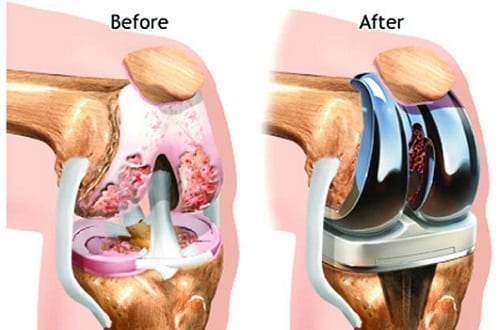Finding Solace and Solutions with an Orthopedic Surgeon for Knee Replacement
The rhythmic thrum of your steps carries you through life’s journey, but when knee pain disrupts that rhythm, the melody turns to a discordant ache. This article delves into the realm of knee replacement surgery, a potential solution for chronic knee pain, and introduces you to the conductor of this process: the orthopedic surgeon.

When the Melody Turns Discordant: Recognizing the SOS of Knee Pain Needing Replacement
Before seeking the expertise of an orthopedic surgeon for knee replacement, understanding the telltale signs of severe, chronic knee pain is key:
- Persistent Pain: Pain that lingers for months, worsens with activity, and disrupts sleep necessitates a doctor’s evaluation.
- Stiffness and Limited Mobility: Difficulty bending, squatting, or climbing stairs due to knee stiffness could indicate significant joint damage.
- Deformity: Visible bowing or misalignment of the knee joint may signal advanced arthritis or instability requiring surgical intervention.
Ineffectiveness of Conservative Measures: If physical therapy, medication, injections, and lifestyle modifications haven’t provided significant relief, a surgeon might recommend replacement.
Inside the Orthopedic Surgeon’s Symphony: Demystifying the Diagnosis and Journey to Knee Replacement
Your journey with an orthopedic surgeon for knee replacement unfolds in these stages:
- Medical History and Examination: Discussing your symptoms, medical history, and lifestyle helps the surgeon understand the potential cause of your pain and suitability for surgery.
- Diagnostic Tests: X-rays, MRIs, and blood tests assess the extent of joint damage, rule out other conditions, and inform the surgical plan.
- Treatment Discussion: Based on the diagnosis and your individual needs, the surgeon will discuss the benefits and risks of knee replacement and answer any questions you might have.
- Pre-Surgical Preparations: Stopping certain medications, adjusting lifestyle habits, and completing pre-operative tests ensure optimal readiness for surgery.
Tuning the Treatment Symphony: From Pre-Surgery to Recovery, Exploring Knee Replacement Options

Orthopedic surgeons offer a diverse range of instruments to harmonize your knee function:
Pre-Surgical Options:
- Physical Therapy and Strengthening Exercises: Building muscle strength and improving flexibility can support recovery and joint stability after surgery.
- Weight Management: Losing weight can lessen the burden on your knee and improve surgical outcomes.
- Quitting Smoking: Smoking slows down healing and increases the risk of complications after surgery.
Surgical Techniques:
- Total Knee Replacement: Replacing the entire damaged knee joint with artificial implants is the most common procedure.
- Partial Knee Replacement: Replacing only the damaged portion of the knee joint is suitable for specific cases.
- Minimally Invasive Surgery: Using smaller incisions and specialized tools can speed up recovery and reduce tissue damage.
- Robotic-Assisted Surgery: Robotic technology can enhance precision and accuracy during surgery, potentially leading to faster recovery and improved outcomes.
Post-Surgical Care and Rehabilitation:
- Pain Management: Medication and therapy will help manage discomfort during recovery.
- Physical Therapy: A structured rehabilitation program is crucial for regaining strength, flexibility, and range of motion in your new knee.
- Follow-up Appointments: Monitoring progress, adjusting recovery plans, and addressing any concerns are essential for optimal healing and long-term joint health.
Beyond the Final Note: The Continued Chorus of Management and Lifestyle Adjustments
Knee replacement is not a one-time performance. Orthopedic surgeons emphasize proactive management:
- Maintaining a Healthy Weight: Continued weight management reduces stress on your knee and protects your new joint.
- Regular Exercise: Maintaining an active lifestyle with low-impact exercises strengthens muscles and promotes joint health.
- Monitoring for Wear and Tear: Over time, knee implants might require revision surgery. Regular checkups allow early detection and timely action.
Conclusion:
Chronic knee pain can disrupt your life’s harmony, but seeking the expertise of an orthopedic surgeon empowers you to rewrite the melody. Through careful diagnosis, personalized treatment, and ongoing support, you can reclaim your knee function, rediscover the joy of movement, and regain control of your well-being. Remember, early intervention, comprehensive care, and proactive management are the chords that harmonize your path to pain-free movement and renewed mobility.
